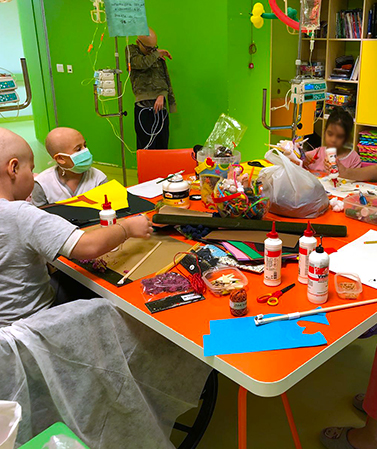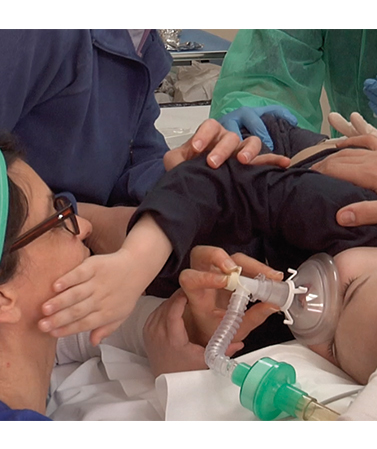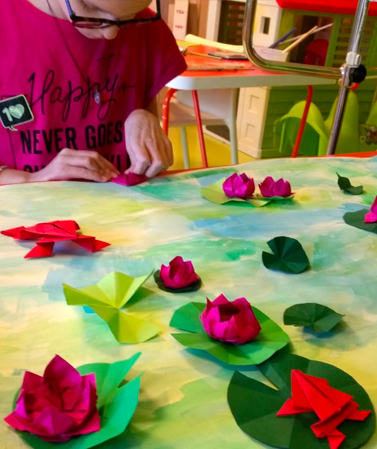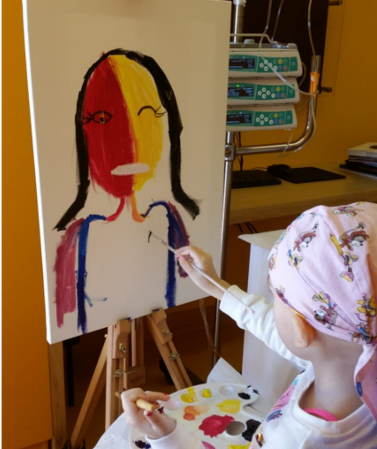

LAD
THE ACTIVITIES
THE INSTRUMENT OF ART STANDS AS A RESPECTFUL
MODALITY OF THE DEFENCES ACTIVATED TO COPE WITH THE PROFOUND SUFFERING TAKING PLACE.
On 11 June 2015, the newly refurbished ‘Dimensione Bambino’
paediatric oncology ward at the Policlinico di Catania was inaugurated.
Thanks to the Alta Mane Italia Foundation, in the regenerated beauty of the premises,
young hospitalised patients and their parents are given the opportunity to use
art and creativity in creative workshops that allow them to express the unspeakable
through the non-verbal and to make cancer illness a little less burdensome.
Art and Creativitystimulate vitality in hospitalised children and maintain constant contact
with their healthy parts. In this way, quality of life is no longer a negligible detail
in the face of illness, but an undeniable right.
The aim is to offer young patients the opportunity to express the distressing and
dysfunctional experiences of the disease through creativity and thus to PREVENT
the long-term effects of the trauma that a cancer diagnosis implies.
HOSPITALITY AND PSYCHOLOGICAL COUNSELLING
LAD ETS pays special attention to Hospitality, believing that timely support in this phase has a transformative value on the whole experience. “Hospitality” begins with the first steps the family takes in the ward, when, looking around, they are confronted with the cancer diagnosis and its effects, on every child they meet. Confusion and despair dominate throughout the diagnostic phase. At this juncture, it is crucial to give hospitalised children and their parents the necessary ’emotional containment’ so that they can distance themselves from the prevailing anguish of death and find the resources to cope with this difficult time. The functional aspects of the individual must be emphasised in an attempt to prevent the depressive stagnation to which cancer leads. All this to facilitate adaptation and promote compliance – that is, the patient’s adherence to the treatment and therapeutic indications received – towards the very long course of treatment.


PSYCHOTHERAPEUTIC ITINERARY
Psychological assistance also extends, in synchrony with the medical team, to the phase following the end of therapy. The ‘original cancer survivor – Off-Therapy’ patient is monitored with periodic psychological interviews at medical follow-ups as stipulated by the national protocols of the Italian Association of Paediatric Haematology and Oncology (A.I.E.O.P.). The assessment carried out using the psychological interview technique and the use of projective tests allows the identification of signs of psychic malaise and the initiation of a possible psychotherapeutic intervention, which is carried out totally free of charge at the LAD premises. The choice of another location is dictated by the specifics of the psychotherapeutic intervention and the desire to contribute to a true return to ‘normality’.
LADORO
The intervention programme, called LADoro, focuses on certain moments recognised as particularly traumatic for the child/adolescent and their family, moments that our programme addresses with the support of creativity, thanks to the transformative value it has on the entire experience of the illness.
– The arrival at the hospital. It is a phase in which confusion and despair dominate and will accompany the family throughout the diagnostic phase. “Welcoming’ begins by accompanying the first steps the family takes in the ward.
– The diagnostic phase. In the field of oncology, it is particularly complex. Basically, it requires intense procedures such as spinal aspirate and lumbar puncture. On some occasions, a biopsy is added, and in all cases where the oncological diagnosis is confirmed, a central venous catheter must be applied with surgery. The times must be very tight, the forty-eight hours are a success medically, but also quite trying emotionally.
– The Diagnosis Communication. The communication of the diagnosis to the parent and the communication of the diagnosis to the child/adolescent should be made at different times, and if the child does not have to participate in the communication made to the parents, they should be able to participate in the communication made to the child. There are also precautions that have to be followed and emphasise the difference between communicating to the child and the adolescent.
– Hospital admissions. These are often prolonged and made particularly difficult by the administration of chemotherapy and the side effects of treatment.
– The terminal phase. Support is needed when the disease gets the better of treatments and therapies are no longer intended to cure, but to alleviate the burden of the disease. It is really difficult to enter that child’s room, words are unobtainable, felt as useless. It is essential, therefore, to define together a creative project that enhances respect for life in progress. It is the daily opportunity to engage vital energy so as not to be crushed by paralysing anguish. It is mainly the parents who use this opportunity to relate to their child, leaving aside their grief for a moment and making every moment spent together precious. The symbolism contained in the images becomes the possible language for dealing with the impervious subject of death.








